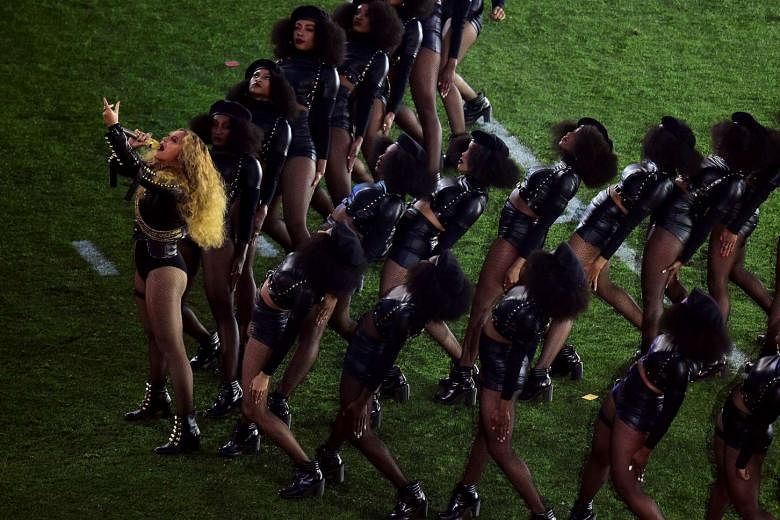NEW YORK • Beyonce, who has mobilised fans around the Black Lives Matter movement without a single protest speech, has drawn the ire of a police group that says it will refuse to attend her coming concert in Miami.
The Miami Fraternal Order of Police said in a statement that it had voted to let its members boycott the April 27 show because it believed the singer had used this year's Super Bowl half-time show "to divide Americans by promoting the Black Panthers". The group called for other law enforcement organisations to boycott her concerts as well.
During the half-time show, Beyonce and her dancers wore outfits widely perceived to be reminiscent of the Black Panther movement, down to the black berets. Afterwards, her dancers also joined Black Lives Matter activists in holding up a sign demanding justice for Mario Woods, a 26-year-old black man who was shot more than 15 times by police officers in San Francisco after he slashed a stranger in the face.
At one point, the dancers raised their fists in salute.
The call for the boycott mirrors another high-profile case. Police groups boycotted director Quentin Tarantino's film The Hateful Eight last October, after he attended a Black Lives Matter protest against police brutality in New York.
"I'm a human being with a conscience," he said, according to The Associated Press. "And if you believe there's murder going on, then you need to rise up and stand up against it. I'm here to say I'm on the side of the murdered."
There are differences between what Beyonce did and Tarantino did to draw criticism. The film director, who is white, faced anger from police groups over a direct remark.
Beyonce's message was unspoken, though still perceived as a threat. In both cases, the backlash was severe.
Mr Victor Kappeler, dean of the School of Justice Studies at Eastern Kentucky University, who has studied policing practices for more than 40 years, said that such responses were part of a relatively new phenomenon by the police: being "politically active".
"You have to understand that that's part of their culture," he said. "Anyone who tries to tarnish the devotion of the police as heroes or breaks out of that discourse is subject to a lot of police scrutiny or blowback statements."
The latest target, then, is Beyonce who, instead of attending protests and making direct speeches against the police, alludes in her Formation music video to the shootings of Trayvon Martin, an unarmed black teenager who was killed by a civilian during a confrontation in Florida; and of Michael Brown, an unarmed black man killed by a white police officer in Ferguson, Missouri.
Both fatal shootings fuelled nationwide debate over race relations, but police supporters have rejected the sentiment of the resulting protests. "Hands up, don't shoot was built on a lie," the statement from the Miami police union said.
In Beyonce's music video, a black boy in a hoodie dances in front of police officers, who respond by raising their hands. In another shot, Stop Shooting Us is scrawled on a mattress.
The visuals in Beyonce's video, some police groups say, are threatening to officers' safety, and the issue of whether to provide security at Beyonce's concerts is spilling into other jurisdictions. On the Facebook page of Blue Lives Matter, a pro-police organisation, a message calling for the boycott of Beyonce concerts has been shared more than 1,900 times.
NEW YORK TIMES

